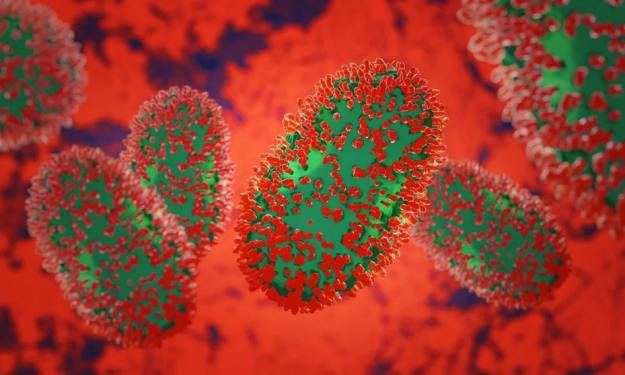Stability and Balance As A Function Of Our Physical Health
Why do we need that balance? How important is that balance to us?

The idea of having a stable baseline is firmly ingrained in our psyches. The baseline provides a sense of stability for us in our day-to-day lives. For example, a salaried employee gets paid a baseline salary of X dollars per month, and from there, they are able to properly plan and budget for their expenses.
This stability is something that an entrepreneur would not necessarily have, especially when they are starting a new business. Getting a stable customer base of Y customers per month, each spending an average of Z dollars, is not something that can be achieved as quickly as an employer being contractually obligated to pay an employee X dollars per month as a salary.
We do desire stability - not just in consideration for our financial health, but for all other aspects of our own health, including our emotions, our relationships, and our physical health.
Emotionally and relationally, we do know that it isn't the easiest to work or live with someone who is emotionally volatile - much less so when they don't see their volatility as a problem at all.
But in terms of our physical health, getting a balance out of the many different cells in our bodies and the biochemical signals that they generate while they are doing their work in our body can be a difficult thing to achieve.
On the macro level, we do need to know how to exert self-control.
It would be nice if we know when to start and when to stop something at their optimum points.
The problem is... we do have internal processes that know when to start - but some of them do not have controllers that tell them when to stop.
For example, smoking opium may be a good way for some people to relieve stress because of the opioid chemicals that an opium smoker can take in. However, when a person doesn't know how or when to stop, they become addicted. And we do see people being addicted to so many different things - it could be sex, it could be binge eating, it could be alcohol, it could be financial greed. All these things are pleasurable, as I mentioned in Addiction Intoxication And The Biochemistry Behind It. They give us a dopamine rush and a feelgood sensation thereafter.
But an imbalanced overuse of that activity to generate more dopamine rushes can ultimately lead to an addiction, which brings with it more problems than pleasure, and also will affect our health in many other negative ways.
On the micro level, we have a good ability for self regulation.
The cells in our body are living microorganisms that operate dynamically. They are taking in nutrients on a regular basis and generating waste as well as other useful biochemical signals for our body to function properly.
The cells in our immune system, as I have discussed in Making Sense Of Our Immune System, function in a similar way. They produce biochemical cytokines that promote or quell inflammatory responses, which are generated in response to any form of injury or threat that the body faces.
I would use this figure as an analogy to describe the inflammatory response in our body:

What we see is a baseline signal followed by many different blips.
When there is no threat from the surroundings, the concentration of the cytokine signals operates at a baseline level.
When an infection arises, there will be a spike (or a blip) in the pro-inflammatory cytokine concetrations as the body seeks to deal with and eliminate the infectious threat.
When the infection has been dealt with, the blip will drop back to baseline levels, as I also do explain in The Drama Of Inflammation And Its Annoying Tendencies.
In this way, the immune system of a healthy human can be self regulated pretty well.
But yet, things that we do can change up the self regulation capabilities.
We live in a world that is currently plagued by the COVID-19 coronavirus pandemic. Prior to the pandemic, people were facing stress from work, eating unhealthy diets and sleeping poorly.
Now, with the pandemic going on about us, people are facing stress from other sources, trying to make ends meet after being laid off, binge eating, drinking more alcohol and still sleeping poorly while being stressed out by things other than work.
And these lifestyle choices are major contributors to how well the immune system can regulate itself, because they are able to signal the production of more pro-inflammatory cytokines to disrupt the current baseline (Four Ways That Our Lifestyle Affects Our Immune System).

When a lifestyle choice turns into a consistent habit (whether voluntarily or involuntarily), we will see a step change with regards to that specific input.
How that input affects our healthis determined by the strength of that input and the time lag that is encountered with that input.
For example, if a lack of sleep causes the body to produce more pro-inflammatory cytokines, we might feel the effects the next morning as a blip. If we were to maintain a good sleeping habit consistently, the inflammation that is generated from our sleeping is kept to a minimum.
However, if we were to experience chronic, or consistent sleep deprivation, things would be different. Our bodies would be producing more pro-inflammatory cytokines over time, and the concentrations of these pro-inflammatory cytokines would be elevated in our blood over time, consistently.
And that changes up the baseline.
When the baseline is changed permanently, can we expect things to operate normally as they should have been?
A marriage, for instance, is the commitment of 2 people to build a life with each other - faithfully. When one person is found to be having an extramarital affair, that creates an unwanted input into the entire process and results in a step response.
Can the spouse maintain the same level of trust in a relationship with their adulterous partner now?
It's technically impossible.
In the same way, when there is a new step input that disrupts the equilibrium baseline of the current system, things will start to behave differently.
For example, the introduction of a higher concentration of pro-inflammatory cytokines can signal cells to disregard the insulin signal, resulting in insulin resistance, where cells take in less glucose from the blood than normal and can lead on into Type 2 diabetes.
Or, the excess inflammatory signalling can cause bone mineral to dissolve back into the blood faster than new bone mineral can be synthesised, which can then lead on into osteoporosis. In the same way, joint cartilage synthesis and degeneration rates can be affected by excess inflammatory signalling to favour degeneration, and that of course can bring about osteoarthritis eventually.
Obesity, too, brings about its own challenges - not just from the excess weight that an obese person is carrying about on their body frames, but also because of what the excess fat cells are doing in terms of pumping in extra pro-inflammatory cytokines into the blood to force a step response change in the immune system's signalling functions.
Is that why, then, that obese people are at higher risk of developing osteoarthritis and/or osteoporosis in their later stages of life?
We do have to be conscious about how our lifestyle choices can affect our health!
Making the right choices promotes stability and a healthy baseline. Choosing the wrong things can affect the baseline and can cause further unpleasant things to happen.
Joel Yong, PhD, is a biochemical engineer/scientist, an educator and a writer. He has authored 1 ebook (which is available on Amazon.com in Kindle format) and co-authored 6 journal articles in internationally peer-reviewed scientific journals. His main focus is on finding out the fundamentals of biochemical mechanisms in the body that the doctors don’t educate the lay people about, and will then proceed to deconstruct them for your understanding — as an educator should. Do visit his website here or his Patreon to connect.
About the Creator
Dr Joel Yong
Engineering biochemical support strategies for optimal health. Subscribe to my mailing list to not miss out on the latest content!






Comments
There are no comments for this story
Be the first to respond and start the conversation.